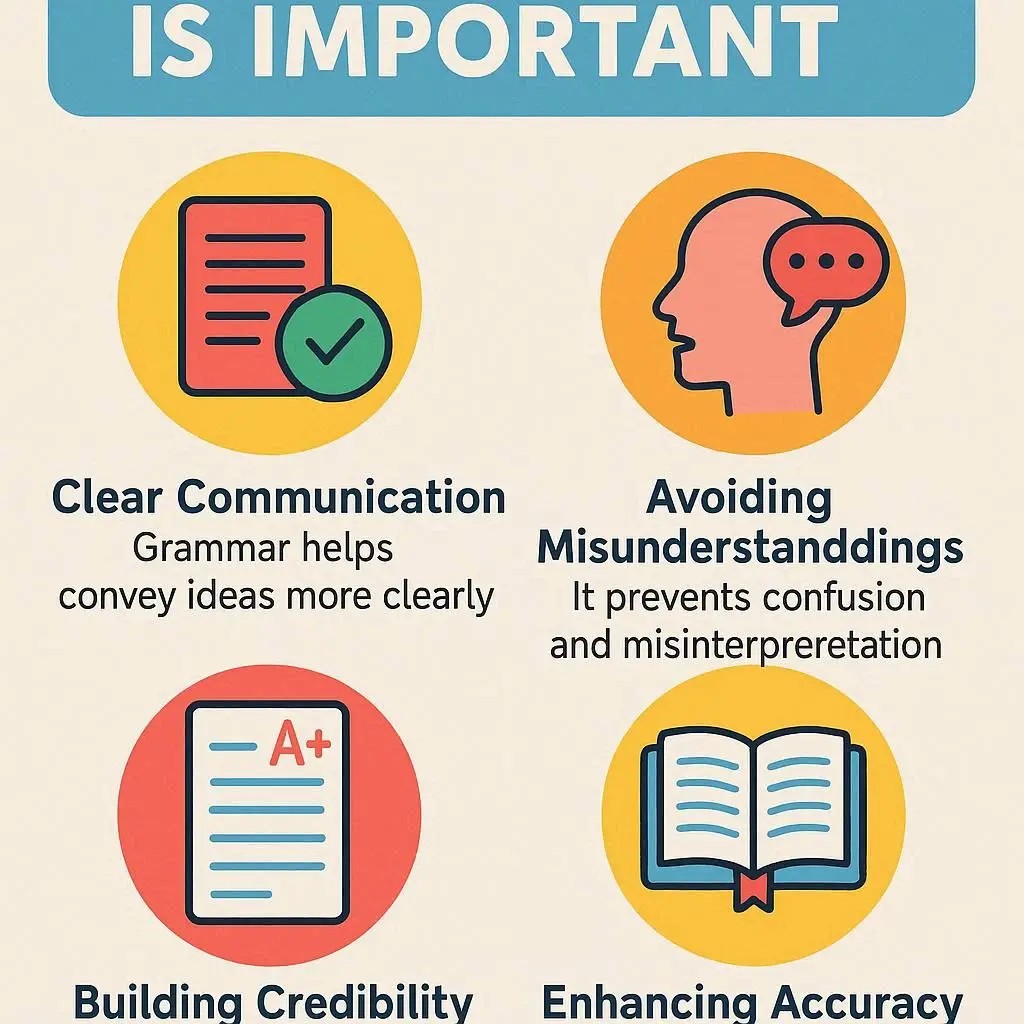Why do we need grammar?
Grammar is essential because it provides the rules and structure for effective communication. Here are the key reasons why we need grammar:
1. Ensures Clear Communication
Grammar helps convey your ideas precisely.
Correct sentence structure reduces misunderstandings.
Example:
“Let’s eat, grandma” ≠ “Let’s eat grandma.”
2. Makes Writing and Speaking Understandable
Proper grammar allows others to read or listen to your message effortlessly.
It organizes words into meaningful sentences, so the reader or listener doesn’t have to guess your meaning.
3. Establishes Credibility
Using correct grammar enhances professionalism and credibility.
Poor grammar can make your writing or speech seem careless or uneducated.
4. Facilitates Learning Other Languages
Understanding grammar in your native language makes it easier to learn additional languages.
Recognizing sentence patterns, verb tenses, and word forms helps transfer knowledge to other languages.
5. Supports Effective Academic and Professional Communication
Academic writing, reports, emails, and presentations require proper grammar.
Helps in expressing complex ideas clearly and logically.
6. Promotes Critical Thinking
Knowing grammar encourages you to analyze and structure your thoughts carefully.
It helps in distinguishing subtle differences in meaning, tone, and style.
Summary
Grammar is not just a set of arbitrary rules—it is a tool for clarity, understanding, credibility, and effective communication. Mastering grammar ensures your ideas are accurately and professionally expressed, whether in writing or speech.
Why Do We Need Grammar?
Grammar is the set of rules that govern how we use language. It's the framework that holds our sentences and ideas together, making them understandable to others. Without grammar, language would be a jumble of words, making it incredibly difficult to convey a clear message. It provides the structure for communication, allowing us to express complex thoughts, emotions, and intentions with precision.
How Does Grammar Affect Communication?
Grammar is a powerful tool that directly impacts the effectiveness of our communication, both in writing and speaking.
Clarity: Proper grammar ensures your message is clear and unambiguous. A misplaced comma or a misspelled word can completely change the meaning of a sentence, leading to confusion and misunderstanding.
Credibility: Using correct grammar shows that you are knowledgeable, detail-oriented, and professional. It builds trust with your audience, whether you are writing an email, a report, or a social media post.
Audience Perception: When you use good grammar, your audience can focus on what you're saying, not on how you're saying it. Poor grammar can be distracting and may make your message seem less important.
What Are the Benefits of Proper Grammar?
Beyond clear communication, there are numerous benefits to mastering grammar:
Professional Advancement: In the workplace, strong grammar skills are often a key indicator of professionalism and competence. It can lead to better opportunities, as it is a skill highly valued by employers in every field.
Academic Success: From essays to research papers, good grammar is essential for success in school. It allows you to express your knowledge effectively and receive better grades.
Enhanced Writing: A solid understanding of grammar allows for more nuanced and sophisticated writing. It gives you the freedom to play with sentence structure and vocabulary to create more engaging and persuasive content.
How to Improve Grammar Skills Effectively?
Improving your grammar is a continuous process that involves practice and a willingness to learn.
Read Regularly: Reading is one of the best ways to subconsciously learn correct grammar and sentence structure. Pay attention to how professional writers construct their sentences and use punctuation.
Use Grammar Checkers: Tools like Grammarly or the built-in checkers in word processors can help you identify and correct mistakes in real time.
Practice with Exercises: There are many online resources and workbooks that offer grammar exercises to help you practice specific rules.
Seek Feedback: Ask a teacher, a colleague, or a friend to read your writing and provide constructive feedback on your grammar.
What Are Common Grammar Mistakes to Avoid?
Avoiding these common mistakes can instantly improve your writing:
Subject-Verb Agreement: Ensure the verb in your sentence agrees with its subject. For example, "They are" is correct, while "They is" is not.
Incorrect Apostrophe Use: Apostrophes are used for two main purposes: to show possession (e.g., "the dog's toy") and to create contractions (e.g., "it's" for "it is"). Be careful not to use them for plural words.
Run-On Sentences and Fragments: A run-on sentence joins two or more independent clauses without proper punctuation. A sentence fragment is an incomplete sentence. Both can make your writing difficult to read.
Misused Words: Be mindful of words that sound similar but have different meanings, such as "their," "there," and "they're." A quick spell check won't always catch these errors.













